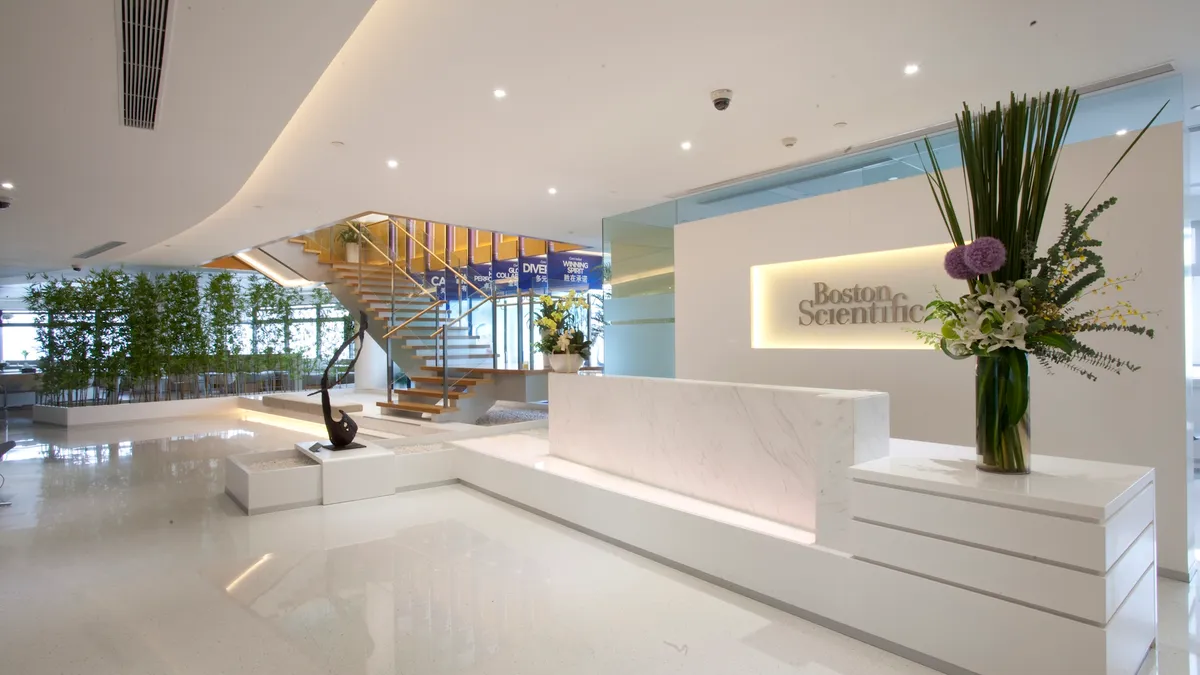Dive Brief:
- Boston Scientific's third quarter was mostly in line with internal expectations after executives warned in September that the delta surge, which forced shutdowns of non-emergency procedures, would likely cause the medtech to miss previous guidance.
- CEO Michael Mahoney said during a Wednesday earnings call the unexpected COVID-19 challenges eased in the final weeks of September as the latest pandemic surge declined. The CEO was optimistic that the fourth quarter and 2022 would improve despite persisting pressure from the pandemic. "We are more optimistic about the improved growth in fourth quarter versus third quarter based on the improved vaccination rates," Mahoney said. "Although, we do expect COVID still to be a bit spotty."
- Overall, Boston Scientific brought in $2.9 billion of sales in the quarter, roughly 11% and 4% organic growth compared to 2020 and 2019, respectively. "Nobody likes to see a softer quarter, but we see today's result as fully expected following the pre-announce at last month's Analyst Day, and view updated guidance as broadly positive for the continued recovery," J.P. Morgan analysts wrote.
Dive Insight:
Boston Scientific was among the first in the medtech industry to caution of a third-quarter hit from the delta variant, a warning proven right as companies like Johnson & Johnson and Intuitive Surgical have reported. While the surge forced a decline in procedure volumes in August and September, the impact on businesses has not been as high as past quarters, a fact Mahoney and other executives attributed to hospitals' ability to better manage surges.
Mahoney argued that while 4% growth over 2019 is "not a great number," the company "had nice improvement in operating income margin, despite some of the supply chain headwinds that everyone's familiar with ... in a quarter where delta surged, we grew top-line fairly well."
The exec noted Boston Scientific is not as reliant on procedures that require longer stays in hospitals, which have been deferred as beds fill up with COVID-19 patients. Mahoney added that the coupling of shorter-term procedures and the migration of inpatient surgeries to outpatient facilities will help stabilize finances going forward.
Staffing shortages at healthcare facilities, however, may be one unavoidable challenge for Boston Scientific and other medtechs. Procedure backlogs may have built up during the surges, but volumes are likely to take a hit if hospitals do not have the staff to operate at normal or pre-pandemic levels.
Ashley McEvoy, J&J's worldwide chair for medical devices, told investors last week that staffing shortages will continue into the fourth quarter and throughout 2022.
Mahoney acknowledged such shortages will persist but contends hospitals will be able to work through them, arguing that changes like using telehealth to pre-screen patients and utilizing outpatient centers can help.
"Hospitals — just like anybody else — they innovate and they find a way," Mahoney told investors. "I think the surges will calm and the staffing shortage will likely linger a bit, but hospitals are pretty resilient in figuring out ways to drive volume."
Boston Scientific saw the strongest growth in the U.S. and Latin America and Canada, at roughly 15% and 29% on a reported basis, respectively. The Asia Pacific and Europe, Middle East and Africa regions trailed, both coming in at 9% to 10% reported growth.
Outlooks for the fourth quarter and beyond hinge on international vaccination rates, which have been increasing in Europe and countries like Japan, South Korea and Australia, according to Mahoney.
A continued bright spot for the medtech is the Watchman left atrial appendage closure device. Mahoney said that the device had double-digit sales increases in the quarter and almost 100% of physicians have transferred over to the newest generation, the Watchman FLX.
Watchman's monopoly recently came to an end when Abbott Laboratories received FDA approval for its competing Amplatzer Amulet device in August. Recent physician surveys suggest Abbott will likely quickly steal market share from Boston Scientific, but Watchman is still projected to remain the market leader.
Boston Scientific has been one of the most active spenders in a year of steady medtech M&A, announcing five acquisitions so far this year. CFO Daniel Brennan told investors that Boston Scientific had $1.9 billion in cash on hand as of Sept. 30 and tuck-in acquisitions will continue to be the spending strategy.











